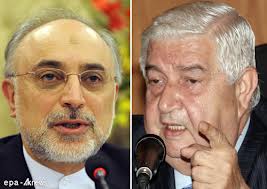 By: Amir Taheri
By: Amir Taheri
With the outcome of the battle for Aleppo, Syria’s most populous city, still uncertain, Iran’s Islamist leaders are pressing the Syrian regime to reject any compromise with the rebels — while the Russians are showing signs of doubt.
Over the past four days, a series of Syrian delegations — including 20 senior military commanders, Deputy Prime Minister Omar Ghalavanji and Foreign Minister Walid al-Muaalim — have visited Tehran to probe the latest twists and turns in Iranian thinking.
Iranian Foreign Minister Ali-Akbar Salehi says his nation’s policy on Syria is now “directly shaped” by “Supreme Guide” Ali Khamenei, who has called the Syrian uprising “a Zionist plot that has to be crushed by all means necessary.”
At a Sunday press conference in Tehran, Syria’s Al-Muaalim echoed Salehi’s statement: “The Supreme Guide’s advice to us is total, unflinching, resistance.” He continued: “The message that I will take back to Damascus is one of resolve to defeat the international conspiracy that Syria faces today.”
The Syrian officials had gone to Tehran to discuss Russian President Vladimir Putin’s plan to end the crisis. Playing off the proposal by UN mediator Kofi Annan, Putin suggests “moving toward transition” in five phases, leading to parliamentary and presidential elections within 18 months.
The Putin plan is the first sign that Russia may no longer be certain that President Bashar al-Assad’s regime can be saved without major changes. It envisages a handover of power to one of Assad’s vice presidents, on a timeline to be determined.
But Iran insists that Assad must remain in power and fight until the “total defeat” of the uprising. “The Putin plan is full of ambiguities,” said a Saturday editorial from IRNA, Iran’s official news agency. And: “Despite its apparent differences with Western and Arab countries that back the armed rebellion, in some cases the plan points in the same direction.”
Thus, while Russia hopes to save the Syrian regime by ditching Assad, Iran believes Assad’s departure would lead to regime change.
“If Assad goes, we shall face an absolutely dangerous situation,” says Hassan Abbasi, a Tehran foreign-policy specialist called “the Kissinger of Islam.” According to Abbasi, the fall of Assad would represent “the first step in a campaign designed to bring regime change to Iran and Russia as two powers capable of preventing” the total domination of the world by the United States and its Zionist allies.
What can Iran do to help Assad hang on?
Well, its moral support will strengthen Syrian bitter-enders and discourage mass defections, especially from the military.
And Iran is already helping by selling oil on Syria’s behalf, alleviating the effect of European Union sanctions. It is also supplying weapons on a large scale. According to Tehran sources, arms worth more than $120 million have been shipped to Syria over the past six months.
Plus, more than 1,500 “military advisers” from the Islamic Revolutionary Guard Corps are present in Syria, providing logistical and technical support to pro-Assad units.
Iran has also dispatched units specializing in urban guerrilla warfare, ostensibly to “minimize civilian casualties” in various Syrian cities. In a Sunday speech in Mashad, Gen. Esmail Qa’ani, deputy commander of the Quds Force — a military outfit whose mission is to “export the
Islamic revolution” — said his men were “actively engaged” in Syria.
He didn’t say how many or where, but his statement is the clearest indication yet that Iran is getting directly involved in Syria’s civil war.
Iran could also deploy some of its Arabic-speaking Hezbollah units from Lebanon. But a plan to send some of its agents from the Mahdi Army in Iraq fizzled out when that armed group’s leader, Muqtada al-Sadr, declared his support for the Syrian uprising.
At some point, Iran may have to commit its own troops on a larger scale to try to keep Assad in power.
Tehran’s no-compromise attitude is likely to provoke a split with Moscow — which is trying to heighten its profile as a major power without antagonizing the majority of Arabs who support regime change in Syria.
“Syria is a red line for us,” says Abbasi, drawing a parallel with the Saudi military intervention to crush a Shiite rebellion in Bahrain.
Iran’s intervention can’t save Assad — but it could prolong the conflict and raise the cost in human lives.
NY Post

Leave a Reply
You must be logged in to post a comment.